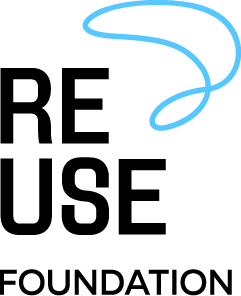Featured
CPG HEAVYWEIGHTS POSITION FOR REUSE |
|
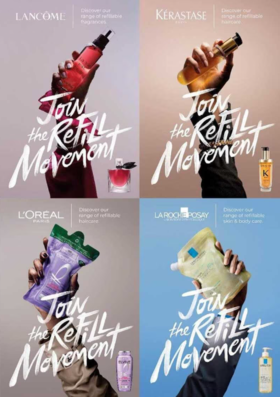
|
Two recent acquisitions show growing corporate embrace of refill and reuse solutions.
Earlier this year Unilever acquired Wild, a fast-growing UK-based natural deodorant brand built around reusable aluminium cases and compostable refills. Wild, a DTC, eco-focused brand with strong consumer loyalty, is particularly among Gen Z and millennial shoppers. Unilever’s move demonstrates that well-designed reuse models can win on both sustainability and consumer appeal and are worth investing in. This month, L’Oréal launched its “Join the Refill Movement” campaign, uniting major brands like Lancôme, Armani and L’Oréal Paris to promote refills as a new beauty ritual. L’Oreal points to research showing 78% of consumers want sustainable products but many remain unaware of refill options. Its campaign aims to bridge this gap, with data showing significant material savings per refill. L’Oréal expanded its refill offerings 17-fold in the last five years and revamped production sites to support circularity. L’Oreal’s move is especially significant given it’s applying reuse solutions to existing brands, and in beauty, one of the hardest categories in which to implement refills.[Image Credit: © L’Oréal] |
Highlights
Colgate Pushes For Circularity With Recyclable Toothpaste Tubes |
|
.png?width=280)
|
On the Two Steps Forward podcast, Colgate-Palmolive CSO Ann Tracy shared how the company is driving sustainability through recyclable toothpaste tubes. Since 2019, Colgate’s open-sourced HDPE tube technology has led to 95% of US toothpaste tubes being recyclable. Tracy stressed that eco-friendly packaging must still deliver on quality and convenience to gain consumer acceptance.[Image Credit: © Colgate-Palmolive Company]
|
UK Shoppers Demand Reuse But Infrastructure Lags |
|
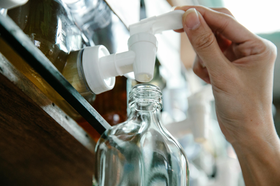
|
New research released on World Refill Day 2025 reveals that 74% of UK consumers want more reusable, refillable or returnable packaging, yet only 18% know where to find it. Environmental charity City to Sea urges the UK Government and retailers to commit to 30% reusable packaging by 2030. Nearly 80% of shoppers already take steps to reduce waste and CEO Jane Martin says lack of infrastructure is the main barrier, not a lack of consumer will. City to Sea also calls for 5% of Extended Producer Responsibility fees to fund reuse systems and campaigns. [Image Credit: © Sarah Chai on Pexels]
|
Sonke Launches Automated Refill Store In South Africa |
|

|
South African startup Sonke opened its first automated refill store, SKUBU, in Johannesburg. In partnership with Unilever’s accelerator program, TRANSFORM, the store offers essential Unilever products like Sunlight and Handy Andy at bulk prices, cutting single-use plastic and saving shoppers up to 60%. SKUBU uses IoT tech for real-time stock and sales tracking and features trained ambassadors to support shoppers. The initiative aims to make refill culture accessible and scalable in underserved communities, addressing South Africa’s significant plastic pollution.[Image Credit: © Sonke]
|
Refillable Packaging Makes Strides But Obstacles Remain |
|
.png?width=280)
|
On World Refill Day 2025, refillable packaging continues to gain traction, driven by new EU reuse targets and industry innovation. Unilever’s acquisition of Wild reflects growing interest in reusable formats, while trials like Borrow Cup in Glasgow and the Petaluma Cup Project in California demonstrate encouraging consumer participation. GoUnpackaged’s trials with Aldi and Ocado also suggest strong demand and highlight environmental benefits. Setbacks linger, such as the intention-action gap, but experts stress the importance of convenience, hygiene, incentives and tailored communication to drive behaviour change and system success. [Image Credit: © Polina Tankilevitch on Pexels]
|
L’Oréal Launches Global Refill Campaign |
|

|
L’Oréal Groupe launched its first global refill campaign, #JoinTheRefillMovement, uniting major brands like Lancôme, Armani and L’Oréal Paris to promote refills as a new beauty ritual. In time with World Refill Day, the initiative uses advertising, social media and retail partnerships to highlight the environmental and economic benefits of refillable packaging. Though 78% of consumers want sustainable products, many remain unaware of refill options. The campaign aims to bridge this gap, with data showing significant material savings per refill. L’Oréal expanded its refill offerings 17-fold in the last five years and revamped production sites to support circularity. [Image Credit: © L’Oréal Group]
|
NLPC Challenges Packaging Policies At Walmart And Colgate-Palmolive |
|
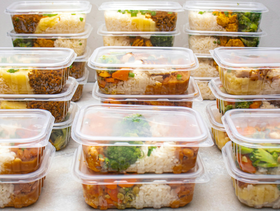
|
Following proposals it presented at recent AGMs for Walmart and Colgate-Palmolive, National Legal and Policy Center said its push for more balanced discussion around plastic use was picked up by media publications. NLPC urged the companies to use more scientific and economic analysis rather than be swayed by what it sees as activist-driven pressure when making decisions about plastic packaging. NLPC’s Paul Chesser noted that major brands like Walmart and Nestlé withdrew from the US Plastics Pact, suggesting that its 2025 goals were infeasible, and argues that current strategies raise costs without providing evidence of environmental benefits. NLPC’s proposals were not passed by shareholders, but nor did those sponsored by pro-recycling activists.[Image Credit: © IARA MELO on Pexels]
|
Washington Fines Companies For Plastic Violations |
|
.png?width=280)
|
Washington’s Department of Ecology fined 23 plastic-using companies $277,000 for failing to meet recycled-content requirements in single-use beverage containers and trash bags, as mandated by a 2021 state law. Fines were based on product weight and recycled content shortfalls. They ranged from $194 to the almost $55,000 fine levied against Arizona Beverages USA. Companies can reduce penalties by entering corrective action plans. Other companies hit by fines included Amazon.com Services LLC ($3,430), Kraft Heinz Foods ($2,499), Ocean Spray Cranberries Inc. ($44,130) and The Kroger Co. ($16,849). [Image Credit: © Brian Yurasits on Unsplash]
|
Clean Cult Launches Refreshed Sustainable Cleaning Line |
|
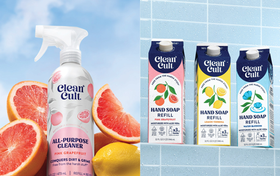
|
Clean Cult is expanding nationally through Target with a revamped refill system designed to reduce plastic waste by up to 90%, covering 1,800 stores and 17 household care products. They are packaged in recyclable paperboard cartons and prefilled, reusable aluminum bottles, replacing the refillable glass bottles Clean Cult previously used. [Image Credit: © Cleancult/Cision US Inc.] |
California Plastic Reduction Bill Faces Hurdles |
|
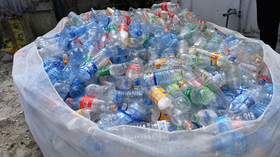
|
California’s proposed Packaging Reduction and Recycling Infrastructure Act passed the state Senate but faces uncertainty in the Assembly. The bill mandates a 30% reduction in plastic packaging over 12 years and introduces extended producer responsibility, requiring companies to fund recycling and waste management. Supporters call it essential to reducing pollution and lowering municipal costs, citing national recycling rates under 6%, but critics argue the bill will raise costs, especially in sectors like food packaging. [Image Credit: © Brighten Silas on Unsplash]
|
Henkel India Leads Mangrove Cleanup For Environment |
|
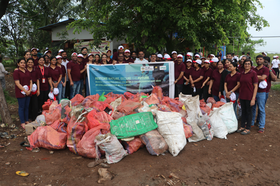
|
Henkel India partnered with Navi Mumbai Municipal Corporation for a large-scale cleanup of plastic waste along the TS Chanakya mangrove stretch, marking World Environment Day. Around 100 volunteers, including Henkel staff, removed about five tonnes of waste from this vital coastal ecosystem, which protects against erosion and supports carbon absorption and bird species. Henkel’s Country President, Sunil Kumar, emphasized the importance of community involvement and sustainability. [Image Credit: © Henkel Adhesives Technologies India Private Limited]
|
Reuse Gains Ground In Fight Against Plastic |
|
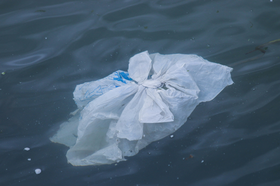
|
In the context of plastic in nature projected to triple by 2040, reuse systems are emerging as powerful tools for reducing single-use plastics. According to the Ellen MacArthur Foundation, shifting 20% of single-use plastic packaging to reuse systems represents a $10 billion opportunity. On the global stage, treaty talks to end plastic pollution are continuing later this year, with businesses and advocates urging binding commitments, and reuse remains a practical, scalable solution in this evolving landscape.[Image Credit: © Brian Yurasits on Unsplash]
|
PepsiCo India Expands Tidy Trails Plastic Waste Initiative |
|
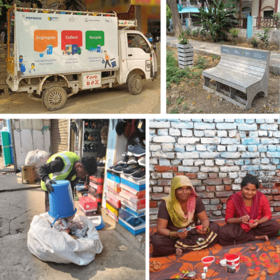
|
On World Environment Day 2025, PepsiCo India, in partnership with The Social Lab, expanded its community-driven plastic circularity program, Tidy Trails, to New Delhi’s Chandni Chowk and Pune’s FC College Road, with further rollouts in Agra and Guwahati. The initiative promotes responsible plastic waste management through collection, segregation and recycling. Collected plastics are repurposed into public-use items like benches and chairs. The program has to date collected over 68 tonnes of waste.[Image Credit: © PepsiCo] |
Action Needed As Annual Global Plastic Production Surges |
|
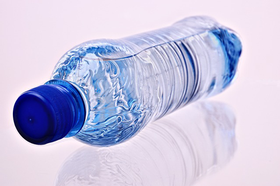
|
Annual plastic production in 2024 was over 400 million tonnes and the OECD warns this figure could exceed one billion tonnes by 2060 if trends continue. With only 9% of global plastic waste currently recycled, pollution is spreading to every ecosystem, including human bodies. INC-5.2 negotiations in Geneva this August represent another opportunity to finalize a legally binding UN plastics treaty after previous discussions failed to reach an agreement. Experts say waste systems alone cannot solve the plastic crisis and that systemic change is needed, from smarter product design, caps on production and harmonised global standards. Victoria Baker of Ecosurety recently wrote that “single-use systems took decades to become financially efficient. Reuse systems need the same opportunity to grow steadily, build volume area by area, and prove their value in practice.”[Image Credit: © Dmitriy from Pixabay]
|
